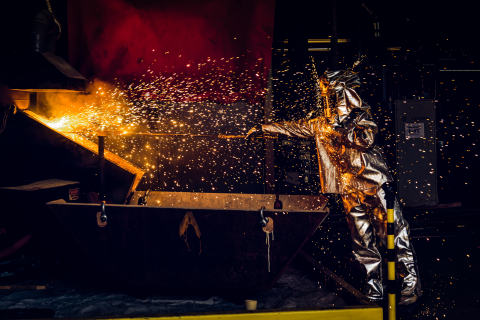-
The work brings
The Metals Company one step closer to realizing its ambition of pursuing full-scale metallurgical processing plant to produce critical battery metals
This press release features multimedia. View the full release here: https://www.businesswire.com/news/home/20210924005053/en/

The Metals Company Processing Pilot Campaign Converts Seafloor Nodules into Alloy Containing Critical Battery Metals (Photo: Business Wire)
Led by The Metals Company’s Head of
“From a metallurgical perspective, nodules are a great feedstock to work with,” said
This latest stage in The Metals Company’s pilot processing program brings the company one step closer to realizing its ambition of building a full-scale metallurgical processing plant and advances the company’s mission of eliminating the solid waste streams and harmful tailings and residues associated with conventional land-based metal mining and production.
“These encouraging results show that nodules could provide an attractive alternative to land-based ores for securing high-volumes of the critical metals needed to achieve energy independence,” said
The Metals Company’s metallurgical strategy is to use a flowsheet which utilizes conventional equipment in a process that intends to generate near-zero solid waste. Compared to land-based ores, polymetallic nodules have relatively lower levels of harmful elements, and the company’s planned dual pyro / hydro-metallurgical process is expected to allow for residues to be recycled to the smelter and for the selection of reagents that produce products instead of waste.
About
TMC the metals company Inc. (
Forward Looking Statements
Certain statements made in this press release are not historical facts but are forward-looking statements for purposes of the safe harbor provisions under The Private Securities Litigation Reform Act of 1995. Forward-looking statements generally are accompanied by words such as “believe,” “may,” “will,” “estimate,” “continue,” “anticipate,” “intend,” “expect,” “should,” “would,” “plan,” “predict,” “potential,” “seem,” “seek,” “future,” “outlook” and similar expressions that predict or indicate future events or trends or that are not statements of historical matters. The forward-looking statements contained in this press release include, without limitation, TMC’s expectations with respect to building a full-scale metallurgical processing plant and eliminating the solid waste streams and harmful tailings and residues associated with conventional metal mining and production, the ability of nodules to help solve national supply needs for nickel and manganese, and the success of TMC’s planned dual pyro / hydro-metallurgical process. These forward-looking statements involve significant risks and uncertainties that could cause the actual results to differ materially from those discussed in the forward-looking statements. Most of these factors are outside TMC’s control and are difficult to predict. Factors that may cause such differences include, but are not limited to: regulatory uncertainties and the impact of government regulation and political instability on TMC’s resource activities; changes to any of the laws, rules, regulations or policies to which TMC is subject; the impact of extensive and costly environmental requirements on TMC’s operations; environmental liabilities; the impact of polymetallic nodule collection on biodiversity in the CCZ and recovery rates of impacted ecosystems; TMC’s ability to develop minerals in sufficient grade or quantities to justify commercial operations; the lack of development of seafloor polymetallic nodule deposit; uncertainty in the estimates for mineral resource calculations from certain contract areas and for the grade and quality of polymetallic nodule deposits; risks associated with natural hazards; uncertainty with respect to the specialized treatment and processing of polymetallic nodules that TMC may recover; risks associated with collective, development and processing operations; fluctuations in transportation costs; testing and manufacturing of equipment; risks associated with TMC’s limited operating history; the impact of the COVID-19 pandemic; risks associated with TMC’s intellectual property; and other risks and uncertainties indicated from time to time in the final prospectus and definitive proxy statement, dated and filed with the
View source version on businesswire.com: https://www.businesswire.com/news/home/20210924005053/en/
Media
Investors | investors@metals.co
Source:
